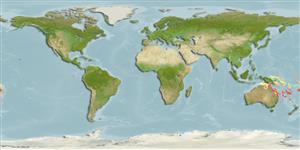>
Perciformes/Scorpaenoidei (Scorpionfishes) >
Bembridae (Deepwater flatheads)
Etymology: Bembras: Greek, bembras, -ados = a kind of anchovy (Ref. 45335); macrolepis: Named for its large body scales..
Environment: milieu / climate zone / depth range / distribution range
বাস্তুসংস্থান
সামুদ্রিক তলদেশ বিহারী; গভীরতার পরিসীমা 46 - 366 m (Ref. 27966). Tropical
Western Pacific: north of Townsville to off Wollongong, Australia.
আকৃতি / ওজন / Age
Maturity: Lm ? range ? - ? cm
Max length : 27.3 cm SL পুরুষ/ লিঙ্গ অনিধর্ারিত ; (Ref. 27966)
পৃষ্ঠীয় কাঁটা (মোট ): 11 - 12; পৃষ্ঠীয় নরম পাখনা দন্ড (মোট ): 10-11; পায়ূর নরম পাখনা্তুন্ড: 14 - 15. This species is characterized by the following: head depressed; body without large scute-like spines; infraorbital bones forming a strong ridge, confluent with uppermost preopercular spine and having 4-6 spines; broad subterminal vertical band in caudal fin (Ref. 40506).
Found on the continental slope. Benthic (Ref. 75154).
Life cycle and mating behavior
পরিপক্কতা | প্রজনন | ডিম ছাড়া | ডিমসমূহ | ডিম্বধারন ক্ষমতা | শুককীট
Imamura, H. and L.W. Knapp, 1998. Review of the genus Bembras Cuvier, 1929 (Scorpaeniformes: Bembridae) with description of three new species collected from Australia and Indonesia. Ichthyol. Res. 45(2):165-178. (Ref. 27966)
IUCN Red List Status (Ref. 130435)
Threat to humans
Harmless
Human uses
আরো তথ্য
প্রচলিত নাম সমূহপ্রতিনাম সমূহবিপাকশিকারী প্রাণী সমূহপরিবেশ বিষাক্ততাবিদ্যাপ্রজনন পরিপক্কতা ডিম ছাড়া ডিমের সংগ্রহ ডিম্বধারন ক্ষমতা ডিমসমূহEgg development
Age/Sizeবৃদ্ধিLength-weightLength-lengthLength-frequenciesমরফোমেট্রিক্সবহিঃ অঙ্গ সংস্থানশুককীট শুককীটের সত্রিুয়তা নির্বাচন প্রাচুর্য BRUVS
সূত্র সংখ্যা এ্যাকুয়াকালচার (জলজ পালন) এ্যাকুয়াকালচার নকশা বংশ বংশানুগতিবিদ্যাElectrophoresesউতরাধিকার সুত্রে পাওয়া যোগ্যতারোগ প্রক্রিয়াজাতকরণ NutrientsMass conversion
সহযোগী ছবি সমূহStamps, Coins Misc.শব্দ ক্রোমোজোমের ধরণ গতি সাতাঁরের কায়দা ফুলকা এলাকাOtolithsমস্তিস্ক সমূহদৃষ্টি
হাতিয়ার
Special reports
Download XML
ইন্টারনেট সুত্র
Estimates based on models
Preferred temperature (Ref.
123201): 19.6 - 24.4, mean 21.7 °C (based on 30 cells).
Phylogenetic diversity index (Ref.
82804): PD
50 = 0.5332 [Uniqueness, from 0.5 = low to 2.0 = high].
Bayesian length-weight: a=0.00389 (0.00180 - 0.00842), b=3.12 (2.94 - 3.30), in cm total length, based on all LWR estimates for this body shape (Ref.
93245).
ট্রফিক পর্যায়ে (Ref.
69278): 3.7 ±0.5 se; based on size and trophs of closest relatives
Fishing Vulnerability (Ref.
59153): Low vulnerability (23 of 100).
